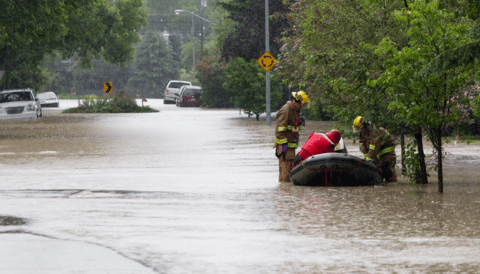The University of Waterloo Climate Institute brings together scientists and students to elevate and enhance the impact and excellence of innovative interdisciplinary research and education that empowers business, government and civil society to respond effectively to the climate crisis.
University of Waterloo’s unique combination of strengths and depth of expertise allows us to deal head-on with the complexity and interconnectedness of social, political and technological dimensions of the climate crisis.
Our expertise and focus
Our three core areas of research and innovation are developed through lenses of equity, justice, governance, and innovation to create truly impactful solutions for this existential global challenge.
News
Building Resilient Communities: Waterloo’s Inclusive Resilience Project on Equity and Flood Mapping
The University of Waterloo’s Inclusive Resilience Project, led by Partners for Action (P4A), focuses on equitable community resilience against climate risks. Collaborating with the Canadian Red Cross and funded by Public Safety Canada, the project developed a Social Vulnerability Index (SoVI) to map socio-economic vulnerabilities and inform targeted flood risk reduction efforts. This initiative highlights the importance of integrating social vulnerability into disaster management to protect Canada’s most at-risk populations.
Waterloo Climate Institute and TRuST Network: Tackling Climate Misinformation Together
The University of Waterloo, in collaboration with the Waterloo Climate Institute, hosted a community lecture addressing climate misinformation. The event highlighted how false information hampers climate action and explored strategies to build public trust in science. Panellists emphasized the importance of accurate information and community engagement in combating climate change.
Research Supports Improving Access to Affordable Flood Insurance
As the cost of flood damage rises, property insurance becomes more costly for Canadians. Currently, over 10% of Canadians cannot get flood insurance. Research suggests that sharing data on flood-risk management between insurers and local governments could lead to more affordable insurance. A Climate Institute member calls attention to the benefits of sharing data and highlights that ignoring this gap will worsen the situation following one of the worst years for insured losses in Canadian history.
Events
Student Pitch Competition – Design a Community Cooling Space
UWaterloo students are invited to design a modular outdoor community cooling space with a sustainable cooling system that will provide relief from extreme heat. This project is in collaboration with Southwestern Public Health (SWPH) which serves the regions of Oxford County, Elgin County, and the City of St. Thomas. Teams will be required to use the design criteria provided below. The winning design will have the opportunity to be part of the ongoing partnership between SWPH and Climate Institute in increasing climate and health resilience.
How to be a Climate Optimist: A talk by Chris Turner
Join the Climate Institute and the Faculty of Environment for an evening with Chris Turner, the award-winning author of How to Be a Climate Optimist. Turner will share insights from his groundbreaking book, which offers a refreshing and optimistic perspective on the climate crisis.












